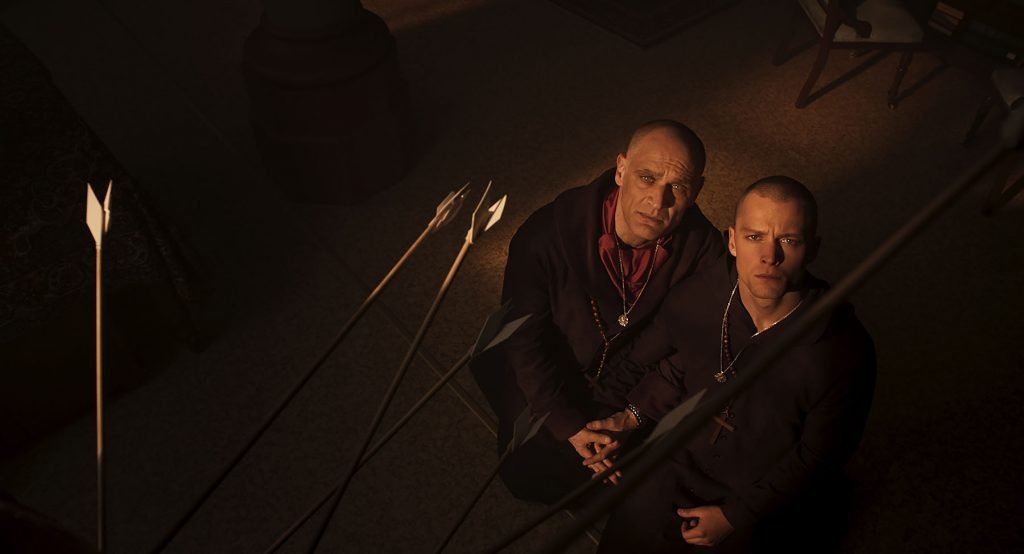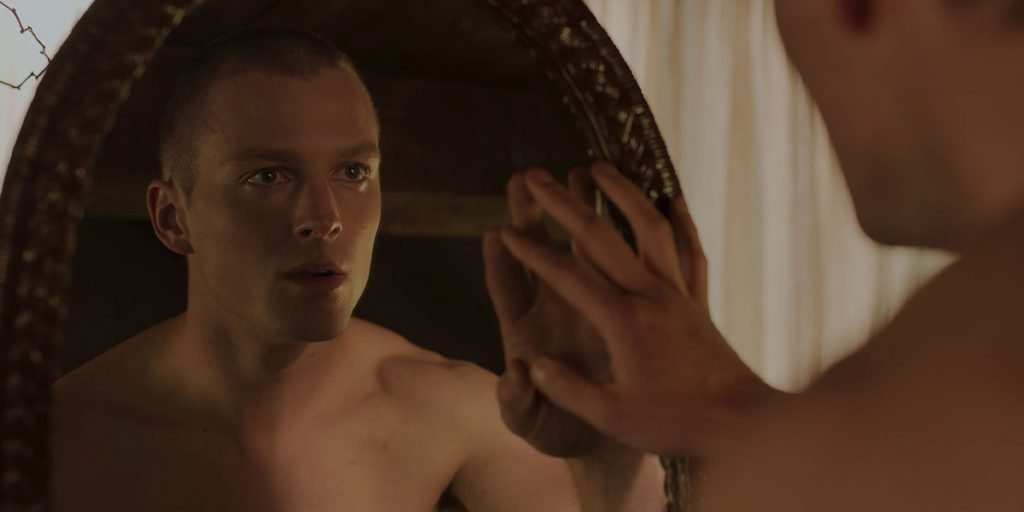In Saint-Narcisse, Bruce La Bruce tackles mythology, religion, and sex to tell a story about narcissism that is equally daring and on-point, in all the right ways.
There are films you watch many times and end up forgetting about within a year or two, and then there are films you only see once, but that stay with you for a very long time. That is the case with Bruce La Bruce’s Saint-Narcisse, a one-of-a-kind gem of a movie I haven’t stopped thinking about since its premiere at the Venice Film Festival in 2020, and that’s supposed to be about a young man who is in love with his own image but is really about what it means to be a human being in the 2020s.
If you’re familiar with Bruce La Bruce‘s work, you already know that the filmmaker (who’s also a writer, photographer, and artist) often addresses topics that many would consider to be taboos: Otto; or, Up with Dead People (2008) is about a horny, neo-goth queer zombie who gets cast in a zombie film, Gerontophilia (2013) tells the story of an 18-year-old boy who discovers he’s attracted to a much older man while working at a nursing home, The Misandrists (2017) revolves around a lesbian separatist group disguised as a nun-run school for troubled girls whose aim is to make a porn film to use as radical propaganda. These are only three titles in a provocative filmography that tackles anything from sexual fantasies and fetishes to politics, religion, vampirism and violence, not to mention a photographic exhibition whose title, “Obscenity,” really says it all, a “porn project” comprised of four short films, and so much more.
But it would be a mistake to dismiss La Bruce’s work as eccentric, excessive melting pots of taboos: what his films have in common, first and foremost, is that they challenge us to delve deep into the darkest sides of humanity. Take Saint-Narcisse: the film does feature depraved priests, unusual fetishes, undead witches, judgemental crucifixes, religious and mythical imagery, horny young women and, yes, even twincest, but it is also an absolutely brilliant, daring analysis of narcissism written by one of the few directors of our time who are brave and skillful enough to tackle those uncomfortable truths no one dares to approach. As non-conventional, purposefully kitschy and beautifully ironic as it is, Saint-Narcisse is also a modern day fairy tale whose apparent madness brilliantly conceals a meaningful message that is neither absurd nor detached from our own reality.

When we first meet Dominic (Félix-Antoine Duval, of For Sarah), he’s sitting in a laundromat. As he waits for his clothes to be ready, he looks at the washing machine, hypnotised: suddenly, he’s having sex with the woman who was sitting next to him and a crowd starts gathering outside, watching him. As he turns around and looks at them, his eyes meet those of a stranger who looks exactly like himself, and that excites him a lot more than the act itself. Dominic eventually wakes up from the daydream to leave room for the film’s title to show up (in gothic font and accompanied by church bells, of course), but that’s more than enough to give us an idea of who Saint-Narcisse ‘s protagonist is: a 22-year-old who has a fetish for himself, so much so that he is turned on by his own reflection and he spends his time taking Polaroid selfies. In the best fairy tale tradition, our hero soon embarks on a quest that’s just as surprising, enthralling and full of unlikely scenarios as it is needs to be, and ultimately discovers a lot more than he thought he would.
What Dominic finds out is not only that his mother, whom he previously thought dead, is actually alive, but also that he has a twin brother. Said brother (also played by Duval) was raised by an abusive, manipulative priest (Andreas Apergis, of Moonfall) whose control he still hasn’t managed to escape, resorting instead to self-loathe: his only way to experience pleasure is to punish himself for his own desires. Of course, a lot more happens in the film, and it’s when the twins finally meet that their respective dynamics, desires and identities begin to change. Though both characters encounter a few others on their journey towards freedom – mainly, their mother, Beatrice (Tania Kontoyanni, of Origami), and her girlfriend, Irene (Alexandra Petrachuk, of On The Basis of Sex), the film mainly focuses on Dominic and Daniel as they grow, evolve and are ultimately reborn as more complete versions of themselves. Though given the arduous task of playing both twins – each coming with a completely different set of character traits and both often seen interacting with one another, Félix-Antoine Duval shines, displaying an incredible range of emotions and ensuring both characters are not just believable but also likeable and relatable.
Saint-Narcisse is as wonderfully ironic as it is clever and full of unexpected, hilarious twists, and uses mythology, religion, sex and apparently absurd scenarios to say something incredibly meaningful. Thanks to a script (La Bruce and Martin Girard) that leaves nothing to chance, encompassing nearly every possible taboo imaginable in a way that makes perfect sense, Saint-Narcisse paints an accurate picture of our selfie-obsessed, individualistic, narcissistic culture, shows us just how confusing it can be to grow up in such a world, and ultimately teaches us to accept and love ourselves in a healthy way, for who we truly are underneath and with all our quirks. With Saint-Narcisse, Bruce La Bruce cleverly captures a specific time in human history and does it with his one-of-a-kind blend of irony and provocation: what results is a film that’s unlike anything you’ve seen before, and that’s not to be missed.
Saint-Narcisse is now available to watch globally on Digital and on Demand, and on DVD in the UK: find out more on Peccadillo Pictures’ site.

